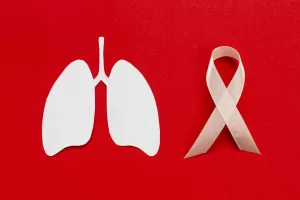
Lung Cancer Treatment Options: What You Need to Know
Receiving a lung cancer diagnosis can be overwhelming, but understanding your treatment options is crucial for making informed decisions about your care. As you navigate this challenging journey, it’s important to familiarize yourself with the various approaches available to combat this disease. From traditional methods like surgery and chemotherapy to cutting-edge immunotherapies and targeted treatments, the field of lung cancer care is constantly evolving. This article will guide you through the primary treatment options, helping you grasp their potential benefits and risks. By arming yourself with knowledge, you’ll be better equipped to work with your healthcare team to develop a personalized treatment plan that aligns with your specific diagnosis and goals.
What is Lung Cancer?
Lung cancer is a malignant disease that forms in the tissues of the lungs, typically in cells lining the air passages. It’s the leading cause of cancer-related deaths worldwide, with over 1 million fatalities annually. There are two main types: non-small cell lung cancer (NSCLC) and small cell lung cancer (SCLC). NSCLC is more common, accounting for about 85% of cases, and may be treated with advanced cancer treatments like targeted therapy and immunotherapy. Lung cancer treatment in Singapore often involves a combination of surgery, chemotherapy for lung cancer, and lung cancer radiotherapy, depending on the cancer’s stage and type.
Who is at Risk for Lung Cancer?
Smoking and Environmental Factors
Cigarette smoking is the leading risk factor for lung cancer, accounting for about 80-90% of lung cancer deaths. The risk increases with duration and intensity of smoking. Exposure to secondhand smoke and radon gas also significantly raises the risk, even for non-smokers. Those seeking lung cancer treatment in Singapore should be aware of these environmental hazards.
Occupational and Genetic Risks
Workplace exposure to carcinogens like asbestos, arsenic, and diesel exhaust can increase lung cancer risk, especially for smokers. Individuals with a family history of lung cancer may have a higher genetic predisposition. Advanced cancer treatments and chemotherapy for lung cancer are continually evolving to address these risk factors. Lung cancer radiotherapy remains a crucial component of cancer therapy in Singapore.
What are the Signs and Symptoms of Lung Cancer?
Lung cancer often remains silent in its early stages, making early detection challenging. According to the CDC, common symptoms include persistent coughing, chest pain, and shortness of breath. You may also experience unexplained weight loss, fatigue, or coughing up blood. While these symptoms can indicate other conditions, it’s crucial to consult a doctor promptly for proper evaluation. Early diagnosis can significantly improve outcomes, especially with advanced cancer treatments available in Singapore, including chemotherapy for lung cancer and lung cancer radiotherapy.
How is Lung Cancer Diagnosed?
Diagnosing lung cancer involves a combination of imaging tests and tissue sampling procedures. CT scans, MRI scans, and PET scans are commonly used to detect suspicious areas in the lungs. If cancer is suspected, a biopsy is performed to confirm the diagnosis. This may involve bronchoscopy, where a tube is inserted through the airways to obtain tissue samples. For advanced cancer treatments in Singapore, doctors may also use endobronchial ultrasound (EBUS) or video-assisted thoracoscopy (VAT) for more precise sampling. Lung cancer treatment in Singapore often begins with accurate diagnosis to determine the most effective therapy approach.
Treatment Options for Lung Cancer
When it comes to lung cancer treatment, Singapore offers a range of advanced options. Chemotherapy for lung cancer remains a common approach, often combined with newer therapies. Lung cancer radiotherapy has evolved, with image-guided techniques providing more precise targeting. Immunotherapy and targeted treatments are revolutionizing cancer therapy in Singapore, offering personalized approaches based on genetic mutations. For those with ROS1-positive lung cancers, new drugs like repotrectinib are expanding treatment possibilities, showcasing the rapid advancements in cancer treatments.
Lung Cancer Treatment Team in Singapore
In Singapore, lung cancer treatment involves a multidisciplinary team of experts working together to provide comprehensive care. The National University Cancer Institute, Singapore (NCIS) offers advanced cancer treatments led by specialists in medical oncology, pathology, radiation oncology, and thoracic surgery. This collaborative approach ensures patients receive tailored therapies, including chemotherapy for lung cancer and lung cancer radiotherapy, based on their specific needs and cancer stage. The team’s expertise in cancer therapy Singapore contributes to improved outcomes for those seeking lung cancer treatment Singapore.
Lung Cancer Treatment FAQs
What are the main treatment options?
The primary lung cancer treatment options in Singapore include surgery, chemotherapy for lung cancer, lung cancer radiotherapy, and targeted therapies. Advanced cancer treatments like immunotherapy are also available. Your doctor will recommend the best approach based on your cancer type and stage.
How effective are these treatments?
The effectiveness of cancer therapy in Singapore varies depending on individual factors. Early detection through screening can lead to better outcomes. While there’s always a risk of recurrence, many patients respond well to treatment, especially when combining multiple approaches.
Conclusion
As you navigate the complex landscape of lung cancer treatment options, remember that every patient’s journey is unique. By working closely with your medical team, you can develop a personalized treatment plan tailored to your specific diagnosis and needs. Stay informed about the latest advancements in lung cancer therapies, but also prioritize your overall well-being throughout the process. With ongoing research and innovative approaches, the future of lung cancer treatment continues to evolve, offering hope for improved outcomes and quality of life. By taking an active role in your care and maintaining a positive outlook, you can face this challenging diagnosis with strength and resilience.
Disclaimer: The content for this article is for informational purposes only and is not a substitute for professional medical advice, diagnosis, or treatment. Always consult your oncologist with any questions regarding a medical condition. Do not disregard medical advice or delay seeking it based on information from this site.

